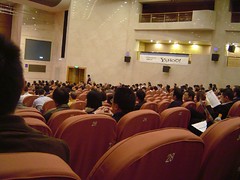Today, I visited Ad:Tech briefly in the morning and attended the keynote panel. It was obvious Ad:Tech this year is an international event. Many people from outside China arrived in the Shanghai International Convention Center. There were not many people attending the conference. The conference hall was about 30% full.



The session was conducted in English at the beginning. COO of Sina and Director of MSN attended the panel. The language barrier was obvious. In which language a conference is presented now is an important decision. English seems to be the usual choice, but it really breaks down the communication this morning. It presents the same problem if the session is completely in Chinese. It is especially hard if English is not the native language for the panelists. I don’t know what about native English speakers; at least I tried very hard to understand.
Chinese-Speaking American
Last week on the China Blogger Conference, Rebecca, former CNN reporter, used Chinese to host the panel of some bloggers from Taiwan and Hong Kong. Her Chinese was amazingly good. It also presented a good solution, a perfect solution actually, since most audience comes from China. Chinese has now been more and more used in some international conference in Shanghai. It is a good trend, from my point of view (obvious it is not for many others).
Translate to English?
Some bloggers in China started the effort to translate the best blog post to English so the outside world can see what common bloggers are discussing about everyday. This provides much more information than media reports. The sad fact seems to be, if something is not in English, it does not exist. One of the organizers admitted his confusion though. He was not 100% confident about the effectiveness of his effort. The problem is, if more effort like translating to English happens, English will become a much stronger language. He wondered why people in Asia still needs to use western media to know the world. For example, to know what is happening in Korea, most information sources are U.S. or Europe media. That is not always a complete view of the world.
I share the some confusion with the organizer of Dongxinanbei. That is the reason I asked: Is English Skill That Important?
Errr, you’d better fix the last sentence.
Also the last two sentences in your paragraph on Chinese-speaking American would read better this way: Chinese has now been used more and more …… . It is a good trend, …… (obvious it may not be for many others).
Well, we have to admit English is still the dominating language for communications in most international occasions. At current stage, we need more talents, good at both Chinese minds and western cultures, to bridge between China and outside world so that foreign people could understand more about the genuine China and our folks could learn more from the rest of the world.
Of course, I’m quite optimistic about Chinese as an international language in
the (near) future. But firstly we Chinese people have to do our jobs even better.
hoho, looks not a successful conference in the sense of making money. at least they rent a ball room too big
AN excellent website about china train schedule.welcome!!!!!!!!!
http://www.shanghaiabc.com/train/china-train-schedule/train.asp
I had a meeting in the Oriental Riverside Hotel this morning, and on the way there in a taxi I read your post. It was not until I arrived at the hotel that I realized that Ad:Tech was also hosted there. So after the meeting I took a quick look. It was indeed not successful: the entrance ticket was USD 495, but with a nice smile I managed to get a ticket for free! Inside there were not that many people, and the session I attended wasn’t too interesting. So I walked around the exhibition area, picked up some promotion material and left. And by the way: there was no working wifi connection in the building (I found some networks, but none worked). Not very smart when you organize a tech conference.
Yahoo!
I love how the most complicated lanuage in the world (English) is the one used by the most people for everything. I wish it was something easier and prettier like Chinese or French.
When the chinese prints their official texts in pinyin, including tonations, then it might be possible for others to learn chinese. Learning chinese characters is simply hopeless, sorry.
Why can’t chinese mobile phones not write pinyin mith tonation signs ?
I was at Ad:Tech and being in the interactive business, have to say the whole thing was great. They were handing out headsets for simultaneous translation in both English and Mandarin so the language barrier you mention was not a problem. The panelists were able to debate issues with each other in either language and it worked well. Admittedly, the keynote events were a bit dull.
If it hadn’t been in Shanghai, I would not have found it so stimulating. I’d never been there before and was really pleasantly surprised by the city in the 2 days I was there, apart from the smokers everywhere and the scary drivers. I found the service to be more genuine than in Hong Kong.
I should also thank you for your info (including map) on how to get to my hotel from the airport which I was scrambling to find on Monday morning. You’re right – I couldn’t find any official airport or city map and ended up on your site and clicking a few times. I printed it out in colour and used it anytime I got in a taxi. Having said that, none of them knew how to read the map, or knew where Pudong Park was, and yesterday I had to resort to drawing a sketch of the TV tower to avoid completely missing my breakfast appointment. Thanks!
I think the choice of language would depend on the topic, the speaker and the audience. In other words, the most appropriate language is the one that can convey the message most clearly. In your case, it is obvious English is NOT the language. I work in the biomedicine field and think in almost all conferences of decent standard English should be the language of choice.
For blogging, I think most of those in China should be in Chinese. But it would be really helpful some of them (like this one) is in English so that non-chinese speakers can get a peek into Chinese blogs. And if they are really interested in China, they probably should learn Chinese.
Today, I just do some internet furfing randemly, found this webpage. Feel its really interesting website. wandering its still operating now?
Jennifer